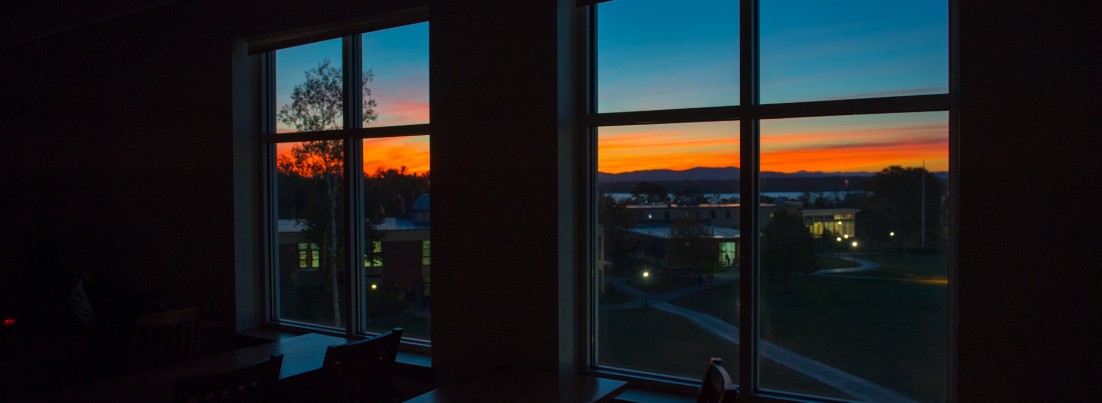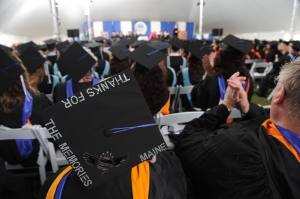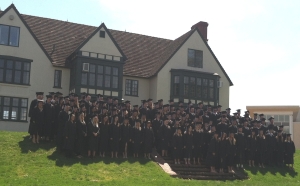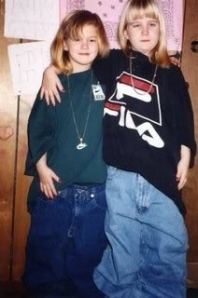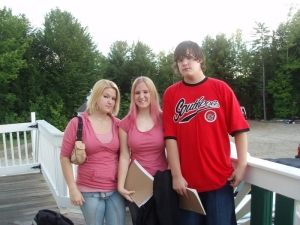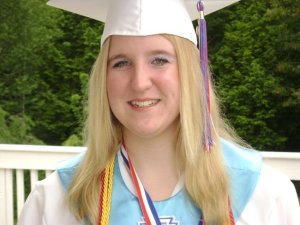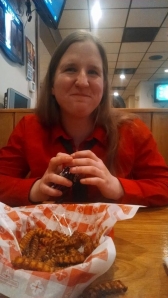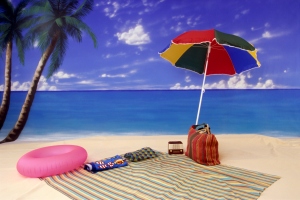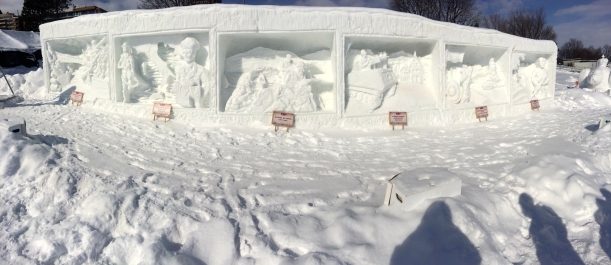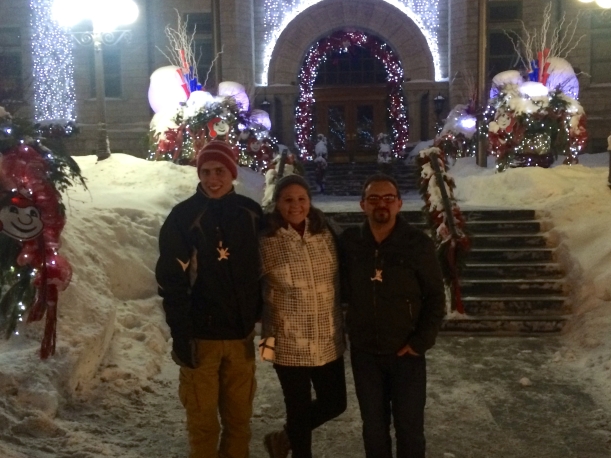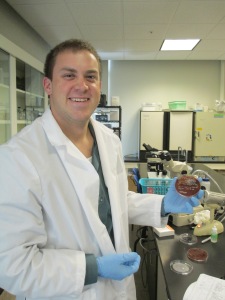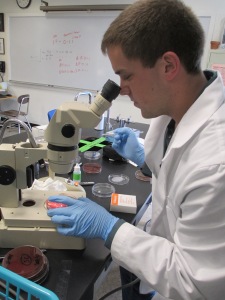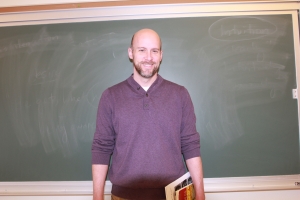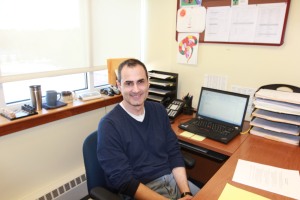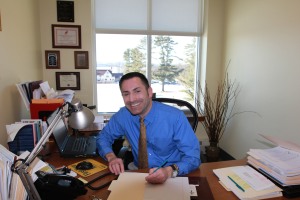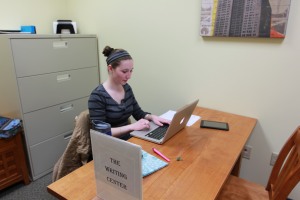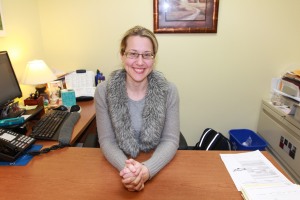Life at SJCME as told by Michaela ’14 has moved! The new blog can be found here: http://blogs.sjcme.edu/michaela/.
Senior Week Events
“41 days until graduation,” words drilled into the heads of an anxious 2014 senior Class on 3/29/14. Only 41 days, I kept thinking to myself. 41…The numbers were always there, but as the senior Class was bound together in the auditorium, waiting to hear about the festivities of Senior Week as well as the pertinent information about graduation practice and graduation itself, reality began to set in. As a college student, I think it is still perfectly acceptable to pretend that I will attend classes again, and the graduation festivities are just festivities, no strings or realization of the future attached. So, with that being said, what kinds of things are they offering seniors this year as they begin to part?
This year, Saint Joseph’s College is incorporating a “Senior Send-Off Fair” April 14 and 15, so that seniors can complete anything they need to do before graduation. This has been referred to as a “one-stop shop” for seniors. At the fair, students will be able to get graduation announcements and tickets, caps and gowns, senior week tickets, and more.
Senior week events:
Tuesday: Senior v. Faculty Softball Game at 3pm followed by the senior Class dinner at 6pm.
Wednesday: Alumni Brunch 10 to 1 pm and then Senior Ball at Skye Event Center at 6pm.
Thursday: Mandatory graduation rehearsal at 6pm and Music Cruise at 7:30pm.
Saturday: Graduation! Line-up starts at 9:15am.
At least after four to five years of reading, quizzes, tests, and papers, seniors have a week to celebrate all their accomplishments. To the Class of 2014, we are almost done! To other students reading this, these are some of the things you will have to look forward to! To faculty and staff, thank you for the four years of kindness, support, and motivational pushes. There are now 32 days left! Let’s show senioritis who is boss!
“Growing Up”
I can’t wait to grow up” a ten-year-old me would tell myself after wiping away the mud off my shirt and pants and taking twigs
and leaves out of my hair. I would spend my day building forts, catching frogs, climbing trees, or drawing my future house in the dirt with a stick. Eventually this would have to end as the sun went down, the mosquitoes came out, and my parents would call my brother, sister, and me inside.“I can’t wait to grow up” a sixteen-year-old me would tell myself after sitting down to piles of homework after getting up at 5:30 to make it onto the school bus, make it to classes, and participate in many extracurricular activities. With the driver’s license came my first job at a fast-food place; with this new freedom came more rules, restrictions, and responsibilities. How is this even possible, I wondered? Twenty-one has to be the best age.
“I wish I could go back to being young, carefree, with little responsibility and naps,” a twenty-one-year-old me whines to a co-worker from one of the already many jobs I’ve had. You would think twenty-one would be a time to get any extra “partying” out of my system, but it really is not so. At twenty-one I was working a few different jobs while attending school, which I take very seriously, juggling family and friends, and experiencing a bit of stress about my future. Where is the fun in this?
“I still have no idea what I am going to do with my life,” a twenty-two-year-old me quietly admits to herself. When people ask, I say I don’t really have much of a plan and that I am going to take things as they come. I have plans depending on what may or may not happen when I graduate to put into practice when the time comes, but I have no real career choice in mind.
Thinking about the future and “growing up” is exhausting. I’m ready for a Disney movie and a nap.
When it comes to what’s next, your guess is as good as mine. Please let me consult my Magic 8-Ball and I will get back to you on that.
Spring “Break”?
So this is blog attempt number two at writing about spring break, and I thought I would write something a bit more about my own experience as a student. I have been back to classes for three days now, and as a senior, I should have some pretty wild or unique stories to tell about what I have done, right? I would love to tell tales of traveling away for Spring Break Workfest, or of spending my spring break in hot weather surrounded by sand, ocean, and tourists, or maybe a story about getting into a fight with a monkey in Africa for stealing a banana from him—something. The truth is, it is year four, the home stretch, and when people ask me what I did over my break, I give them all the same answer: “A whole bunch of nothing.” And that may be why this post is difficult to write.
My spring break can be summed up in a few words: Walmart, homework anxiety, and shopping.
Walmart: Well, it probably isn’t a big secret that I have been working at Walmart for over two and a half years, stocking shelves in dairy and in frozen. Pretty “cool” job, huh? Yes, especially when during spring break the weather is 30 degrees or less and there is a threat of a snowstorm on your doorstep. Luckily I did not have to pick up any extra shifts. This made me think that, finally, I would get those four 10-page papers done!
Homework Anxiety: A little before completing my first semester as a senior, a super klutz, (who we shall call…myself), spilled some water underneath my laptop. Granted, the laptop wouldn’t work unless it was plugged in anyway, but now the keyboard also would not work. The laptop was almost five or six years old, so it was not a big deal and I just bought a new one. About three weeks into ownership, it started malfunctioning and I couldn’t return it due to the 15-day return policy at Best Buy. So, over break, I was trying to work on some of my papers without my laptop. However, the laptop is still there taunting me, and I just want nothing more than to be lazy during my break. Maybe senioritis really does exist? Maybe the laptop frustration was just too much?
Shopping: Admittedly, I am not much of a shopper. My mother wanted to go shopping a few times, and so did friends. I frequented JC Penney about four times in three days, and went to New Hampshire to see what they may have. Even in New Hampshire, I couldn’t escape Walmart. One of my managers was in the same store I was, of all places!
Simply put, my spring break was nothing to be excited about. It is nothing like you see on movies or TV, and I am sure for many students, they have to spend their time working or stressing out about homework as well. It is okay though. This past spring break brings an even larger realization than just that I did not do anything amazing my final year: I am a senior in my final stretch of college as an undergraduate. Hard work will pay off in the end; I just have to keep my eyes on the prize and cross the finish line.
Quebec City Trip: As Told By Jacob Moberg ’16
Over Presidents’ Day Weekend, students took a trip to Quebec City for a short break from the academic atmosphere. The trip, hosted by Student Activities, was a wonderful way to relax and have some fun. Students were able to explore the many restaurants, shops, and beautiful sights that Quebec City has to offer and got to experience the 60th annual Winter Carnival. With a parade, dancers, and snow and ice sculptures all around, Quebec City and the Carnival were a wonderful way to enjoy the long weekend.
Student Jacob Moberg went on the trip and had a lot to share about his adventures.
I had never been out of the United States before, so I quickly made the choice to take the trip to Quebec City. Although Quebec is only about an hour or so away from the U.S. border, it was a new experience for me, so I was very excited. As I sat on the bus on the way there, I began picturing how the city would look. I didn’t know much about the city at all, so I was left picturing something that looked a little like Boston. I have always been a fan of Boston, so I was excited to see how Quebec would look.
We reached the outskirts of the city and I could already tell I was going to have an amazing time. The tall buildings and the drastic change of scenery were a nice change of pace from the scenery I have grown used to at Saint Joseph’s College. Of course, Portland is only about half an hour away from SJC, and so the view of tall buildings and the fast pace of being in a city are easily accessible. However, I have had to spend much of my time on schoolwork and other projects and have been unable to travel to Portland much. I was accustomed to being in a woodlands atmosphere, so being in a city was a nice change.
The bus pulled up in front of our hotel and my heart started pounding from excitement. The hotel looked very nice and the many of the other buildings that were in the same square looked so interesting. One building immediately caught my attention, for it looked liked the walls that one sees outside of an old castle. There was a blend of old Quebec and new Quebec, and the sight was so intriguing.

I got settled in my room with my roommates and I looked outside to see the view. We had been put in a room that looked out into the patio area of the hotel, so there weren’t many views to see. However, I spotted hot tubs and thought to myself, “Relaxing in a hot tub after a long day of exploring the city? I can’t wait for that!” One of my friends that had joined me on the trip began explaining to me what places we could go explore. He knew his way around the area that we were staying in, since he had come on the trip last year. We got our coats on and headed out to explore.
The first thing that caught my attention was the many ice bars that were set up in front of the small stores and pubs that were on the same street as our hotel. The designs of the bars were so elaborate and beautiful to look at. We continued down the street and ended up at the fairgrounds for the Winter Carnival activities. There was a massive ice block building, a small concert stage, snow sculptures, and a small toboggan race track. There was so much to do! Since the area was crowded, we decided that we would check out the carnival the next day. At this time, it was about 5pm, and we were hungry. We went into the old part of Quebec and there were so many different restaurants, all focusing on foods from different countries. We walked down to an Irish pub and I could see an Italian restaurant across the street and a Mexican restaurant up another street. We eventually went into the pub and were seated quickly. I ordered food and it turned out to be one of the best burgers I had eaten in a long time. Many of the people, who worked in the restaurant, though they spoke French as their first language, also spoke English which I was very thankful for.
After eating at the pub, we made our way back to the hotel just in time to see the Winter Carnival parade floats pass right by our hotel. Seeing these floats reminded me of Disneyland. Each float had a different theme, with my favorite probably being the float that had an acrobat jumping off of a platform, landing on a trampoline, and doing tricks in mid-air as he made his way back to land on the platform. Although it was relatively cold out, the excitement of everyone watching the parade definitely created a warm and entertaining atmosphere.
After the parade and a long day of exploring, we decided to relax in one of the hot tubs at the hotel. It was nice to start winding down from the day and to talk about how much fun the trip had already been. Once we got back into our room, and realized that we still had some energy left, we decided to go out again and burn off the last of the energy. Right down the street from the hotel, only about 50 feet away from its exit, was a small basement pub. We made our way downstairs and entered the pub. It was a little crowded, but we managed to find seats. We sat and listened to a pretty decent guitarist sing different ’90s rock songs. It was so much fun to see how into the music everyone was getting. Some people were dancing and others were singing along to the songs. The atmosphere was so welcoming, and I left the pub knowing that I definitely wanted to come back to Quebec City as soon as possible.
This is just a glimpse into some of the activities offered here at Saint Joseph’s College. If you would like to see more of what Saint Joseph’s College offers its students, visit http://www.sjcme.edu/student-life/activities.
Meet Biology and Psychology Major Robert Michaud ’14
Saint Joseph’s College of Maine has a campus of approximately 1,000 students, and the ratio of students to faculty is 12:1. The campus is small, so it is easier for students to get to know one another and find out what others are learning and doing with their majors.
One student here at SJC who would like to share about his work is biology and psychology major Robert Michaud ’14. Here is a bit more about Bobby, his goals, and how he hopes his majors will help him achieve those goals.
What are your majors?
Biology and psychology.
Why did these majors appeal to you?
These majors were appealing to me because I have always been interested in the sciences. Biology is of interest to me because I want to become a doctor, and this major had a lot of information about nature and the human body. I have always been fascinated by nature, and I hope to do clinical research on the brain. Research is something that I have always wanted to do for as long as I can remember and this is what made me decide to double major in biology and psychology. By having both degrees I will be more prepared for my future.
Why would you suggest these majors to an incoming student?
I would recommend both of these programs to someone coming to Saint Joseph’s College. The biology department has many devoted members who are passionate about their students. The faculty are always willing to help and help you find opportunities for advancement. It is not an easy program, but you will get out what you put into it, and I have learned a lot about biology. The psychology department is also incredible, and I think it is one of the best departments on campus. The faculty are some of the best professors I have had at Saint Joseph’s College. The department is very well organized, and everyone wants you to succeed. I have had many opportunities within the psychology department to learn and grow. Both biology and psychology are great programs!
What sort of things do you study within you majors? How would you describe them to someone who may not know what they are all about?
In biology we essentially study life. This ranges from cells to large ecosystems. One course that I am currently taking is biochemistry. Biochemistry is the study of all the biochemical pathways that take place in our bodies and other organisms to allow them to function. This included the citric acid cycle, oxidative phosphorylation, and many more. These processes are very complex, but, in simple terms, they are how we get energy out of glucose.
Psychology is basically the study of human behaviors. There are many fields of psychology, each having its own perspective of study. Currently, I am taking a counseling skills class, where I learn about different skills to use when talking to clients.
Psychology and biology are also closely linked, and I have taken classes that involve a combination of the two fields. Health psychology was a class that examined the biopsychosocial model of psychology, which essentially says that biology, psychology, and social behaviors are all connected. This class took a very interesting approach to explain human behaviors.
What are some interesting things you may have done/experienced in classes pertaining to your majors?
Since there are many different fields of biology, there are a variety of classes as well. One of the classes that I took was developmental biology. In this class, we examined the process of development. It was a comparative embryology course. During this course, I was able to see the fertilization and formation of a sea urchin zygote, which then becomes an embryo. This process was incredible and interesting. I was able to see life forming in front of my eyes!
There are two courses that are very memorable for me in psychology. The first class was evolutionary psychology. This course, which is a relatively new field in psychology, looked at how evolution and behaviors worked together. It was very interesting. I learned many explanations for our behaviors, one example being that when women are pregnant they experience morning sickness and sensitivity to different types of food. This usually occurs during the first trimester when the baby is developing the most. The mother experiences these sensitivities because it is an evolved psychological mechanism that is designed to protect her and her baby. Now that is interesting!
The second class was psychological testing. This class was collectively intriguing because it examined the different techniques we use to measure a person’s behaviors and make predictions about his or her behaviors. We learned about different tests, including the Stanford-Binet intelligence test and different personality tests.
What are your plans, hopes, and dreams for your future?
My current plan is to use these majors to propel me to the next stage in my education. This involves going to medical school and working toward an MD/PhD in neurology. I am interested in doing clinical research on the brain, and I hope to be part of a team that can uncover its many mysteries. Using my experience in biology and psychology, I will be able to take a unique and valuable approach to the research of the brain.
10 Tips for Surviving Quizzes, Tests, Midterms & Finals
It is February, and classes have been in session for a while. As I think about how quickly time has flown by and how I cannot wait for spring break, I come to the realization that midterms are, once again, fast approaching. Each semester I could hardly believe that the halfway point had already arrived, and each semester the impending midterms would cause me some stress.
So, over the years I developed some study tips. Of course, not all these tips will work for everyone, but I wanted to share some of them for student readers.
1. Attend class and READ the material you are asked to, sitting up, and in a quiet area with no distractions. Studies have shown that if someone reads or studies sitting up at a desk and then takes their test in a similar environment, it may help jog the person’s memory.
2. Learn how to take and organize notes. In a class full of terms and people to remember, it is best to set up your notes by writing them down in a way which is appealing to the eye. Use indents when taking notes, bullet points, and numbering. Sometimes it helps to highlight the terms. In my experience, long streams of notes make it hard for my eyes to focus and makes it more difficult for me to understand the notes I have taken.
3. WRITE your notes by hand. The more you write something, the more likely you may be to remember them. Typing notes is great for organization, but I think your notes are not as committed to memory when typing.
4. Study your notes over a period of time, not just the night before.
5. Ask the professor questions as the class goes along. And if you cannot ask in person, email them. At Saint Joseph’s College, the professors are there to help you! Just don’t wait until the night before the test to bombard your professor. If you do not understand something in the first days of class, it can skew your understanding of the rest of the class.
6. Studies have shown that when it comes to memorization, people tend to remember the first things on a list and the last things on a list, but not as much in the middle. My tip for you would be to focus on the middle of your notes. However, do not disregard your other notes!
7. Use mnemonic devices. Example, PEMDAS or Please Excuse My Dear Aunt Sally is used to remember the orders of operation in math.
8. Ask a classmate with help studying or see a peer tutor. Sometimes students can explain or relate a concept in a different light than the professor did.
9. Eat well, exercise, and get plenty of sleep the night before your quiz or test. A healthy body and rested brain will help you to retain information.
10. Do not stress too much! A little stress is okay, but too much focus on stress will distract you from studying. Just take a deep breath and relax.
These are just 10 tips to help you study and prepare for exams. Maybe not all of these will work for you, but at least you can try them out. Keep in mind, however, that sometimes we may have an “off” day and not do as well as we hoped to. If this happens, do not let it set the mood for the rest of your tests and quizzes. See them as an opportunity to fix your off day. You CAN and WILL succeed as long as you put in the effort. Just remember:
Relax. Prepare. Conquer.
What is Happiness?
Happiness/Character/Well-Being
There is one thing that almost all people strive for, and that is happiness. But what exactly is happiness? Is happiness something real? If it is real, can happiness be measured? Is happiness something attainable for everyone, and if so, what are the steps one must take to be happy? Some of these questions are philosophical in nature, some are psychological, and some are both.
This semester, spring 2014, I was able to discuss and explore some of these questions with the help of professors Dr. Joshua Schoenfeld (psychology) and Dr. Christopher Callaway (philosophy). These two professors, after discussing their fields with each other over the years, recognized the overlap between their domains of study and thought that it would be a great idea, instead of trying to separate the domains, to show how they intermingle. The class is one of the firsts of its kind and, “one of the things that precipitated it was the previous dean, Randy Krieg, mentioning that it would be good to offer some interdisciplinary team-taught courses,” says Dr. Callaway.
How Does the Class Work?
Each professor will teach a section from our reading and explain it while the other is in the room. In this way, the professors can point out the connections between the domains easier or raise questions to one another on how it can be viewed in a different light. Dr. Schoenfeld states, “One of the things that is really important to me in the field of psychology is that psychologists do not go beyond the bounds of their specific scientific process and make claims that outstrip their knowledge. This is really tempting, and most psychologists do it, and I really don’t like that. So, I really appreciate talking to a philosopher because he makes sure that there is sort of a touchstone to relate back to when making claims.” Dr. Callaway agrees with this reciprocity, stressing that sometimes philosophical theories should or need to be tested, and science is one way this can be done. Students are also encouraged to discuss and ask questions, so ideally there will be a deeper and richer understanding of happiness when the class ends.
I have only had this class for about a month, but here are a few things that I have learned about happiness that you may want to take away from this reading.
-
The Stoics are just a little crazy when it comes to their approach of happiness. Essentially, they believe that everything is determined and so to be happy, we must simply accept our fate. We cannot control space or time but we can control how we REACT to something.
-
Hedonism says we should satisfy our appetites and desires as often and intensely as possible. Happiness is also identified with pleasure.
-
Plato thought that we had three parts to the soul: rational (reason), spirited (pursues honor, respect, recognition), and appetites (bodily needs/wants), and that we are happy when our rational part controls the other two parts.
-
Happiness is important to your psychological wealth, which is essentially a bunch of different things that make you psychologically healthy in terms of your cognition, emotion, and behaviors.
-
Happy people, on average, normally live longer lives than those that are unhappy. They also tend to be less likely to get sick or contract diseases. However, they also measured how long a person lives after they have been diagnosed with a disease, and happy people actually tend to fare worse than their unhappy peers. One explanation for this is unhappy people tend to feel more pain or be more likely to visit a doctor than those that are happy. Because of this more intense pain, doctors are more likely to diagnose and treat earlier than those who are happy and feel less pain or are optimistic that what they are experiencing is “nothing to be worried about.”
-
Most importantly: HAPPINESS IS A PROCESS, NOT A PLACE! Sometimes, the process of getting to a goal can make you happier than reaching the goal itself. Often times if we become too focused on a goal, we may miss the things around us that can be rewarding and give us happiness now, in the present.
Recently, the class discussion was about happiness as it relates to social relationships and work. There are some psychologists who only study social relationships. We watched the video below, which I found to be rather interesting. Dr. Schoenfeld made sure to state that Jim Coan’s findings are only a piece to the puzzle of happiness in social relationships and that there are many other questions still to be answered. But with Coan’s findings, it lays a groundwork for further study. If you have 13 minutes to spare, the findings are pretty amazing to hear about.
As I mentioned earlier, I am only a month into class, but I have already learned so much about happiness and the theories and evidence of its existence and operation in our lives. I do not think that all classes can be combined in this way and that not all pairings of a team-taught class will be successful; but so far the class is operating smoothly, is engaging, and is a breath of fresh air because of its uniqueness.
What Is “TAC”?
What Is “TAC”?
“The most important thing is just being there to help if needed. Sometimes it is not about the subject matter, it is about organization, note taking, or time management. This program helps students in all aspects.” – Shannon Simpson ’15
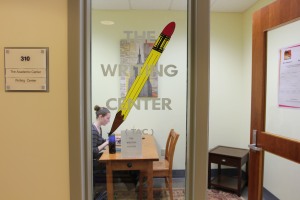
The Writing Center, an offering of The Academic Center, is located on the third floor of Harold Alfond Hall.
Have you ever been to the third floor of Alfond Hall and wondered what the room is to the right at the top of the stairs? What is that closet-sized little room with the pencil decal on that glass that says “The Writing Center (TAC)”? You continue to walk and notice another room to your right that says “ADA,” which has three more additional rooms inside. What are these places?
Like many other students, I had no idea what these places were until someone asked me to look into becoming a writing tutor as a sophomore. I came to learn that these rooms were all part of a larger entity known as The Academic Center. In order to gain some insight into what The Academic Center (TAC) truly is, I spoke with the assistant academic dean and TAC’s director, Mr. Vincent Kloskowski, and found out some of the following things.
A Brief History
The Academic Center started almost 10 years ago. The MELMAC Foundation gave Saint Joseph’s College a generous grant that would assist the college in putting together a formal center for student academic services. Prior to 2005, many of the available academic services were scattered across the campus. If a student needed help with writing, they had to see the English department. If a student needed help with science, they had to see the science department. With the grant from the MELMAC Foundation, which also coincided with the building of Alfond Hall, TAC was created.
What Is The Goal of TAC?
The primary goal is to see each student with their goals and aspirations and help them to persevere. The goal is to get each student to the finish line (graduation) and assist the student to ensure success. Mr. Kloskowski says, “Our goal is academic success for all students, whether they have a 2.0 or 4.0, so we want students to be successful in their majors, their programs, their careers, their futures…. We don’t want any student falling between the cracks.”
What Services Does TAC Offer?
The Academic Center offers peer tutoring, The Writing Center, ADA (learning disability) accommodations, time management and study skills, and the First-Year Experience Program (FYE). FYE is actually a new credit-bearing course that helps first-year students make the transition from high school to college. Incoming students of fall 2014 will complete the first cycle of students who have taken FYE. (The first class of FYE students will graduate in 2015.)
Peer Tutoring and the Writing Center
As a writing tutor, I wanted to take a moment to examine the tutoring program more closely and see what it means to be a peer tutor. Andrew Bonneau ’16, a history tutor, tells of the importance of the program. “The most important thing about tutoring for me is the opportu
nity to help others succeed. Student tutors are great help to others who
either can’t or are intimidated by asking their professors for help. I believe that tutoring benefits SJC because it helps build another level in the academic community here.” Others here would agree with Mr. Bonneau. Shannon Simpson ’15, a sociology tutor, states, “The most important thing is just being there to help if needed. Sometimes it is not about the subject matter, it is about organization, note-taking, or time management. This program helps students in all aspects. We are a close community, and this program makes people feel more comfortable asking for help. The people who tutor are students who have gone through the same things, so sometimes people can relate to them more than they can relate to their professors.”
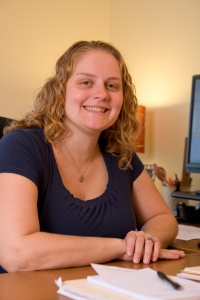
Shanna Webster oversees the peer tutoring program and coordinates FYE programming and Study Away (formally Study Abroad).
What’s Next? Who Can I Talk to for More Information?
Another thing that will be happening in the fall will be a peer mentoring program. Sophomore- through senior-level students will basically be working with the faculty and the FYE program to be a student assistant, helping our first-year students’ transition properly into Saint Joe’s for the academic year. Advertising has begun and interviewing will begin shortly.
If you would like more information you can see Holly Sanborn, who primarily oversees ADA accommodations and advises liberal studies students; Shanna Webster, who oversees the peer tutoring program and coordinates FYE programming and Study Away (formally Study Abroad); or Vincent Kloskowski, assistant dean of the college and the director of TAC.
In Summary
TAC provides a variety of services for students to help with their success. However, it was stressed to me by Mr. Kloskowski that you do not necessarily need to have a reason to stop by TAC. Come in, use the space, say hello to Shanna, Holly, or Vince. The space is for all students and all are welcome!
Who am I, and What Is This Blog?
Hello, readers!
My name is Michaela, and I’m a 21-year-old student graduating from Saint Joseph’s College of Maine in May 2014 with a degree in English and possibly a minor in philosophy. I love to observe, think abstractly, and try to see different points of view, so, naturally, these domains of study appealed to me.
Similar to many college students, every day is a balancing act between school, work, and play. I set daily goals, such as forcing myself to get out of bed when it feels like the hardest thing in the world to do, to remembering to eat breakfast, motivating myself to write that paper that really doesn’t interest me, prioritizing what bills I should pay first, and so on.
I commute to campus every day, which is about a 25-minute drive. Throughout my college career, I have worked from 30 to more than 40 hours a week. Some of these jobs included tutoring at the College’s writing center, working at a little café/catering company off campus, and stocking shelves in the frozen food and dairy sections at Walmart.
About This Blog
So, what is the point of this blog? I want prospective students and their parents to have an additional resource for information, through the eyes of a student who has spent four years here. I want current students to be able to read about some of the wonderful things offered here on campus that they either have attended or may want to attend in the future, and to smile because they have the option to be part of the SJC community. I want faculty and staff to see the inner workings of a college student’s mind, which can only help them help us.
I would love for the blog to continue on with students who can offer different perspectives from mine, to be something that shows how Saint Joseph’s College, an educational institution that has been open since 1912, has changed over time. The blog can help uncover some of the things that makes Saint Joseph’s College more than just a beautiful campus – it can shed light on the amazing faculty, staff, and students through interviews and profiles, answer questions students may have always wondered about Saint Joseph’s College – from the mundane to abstract – and open the public’s eye to more than just the campus scenery and the financial aspect of college.
To the bloggers who come after me, I hope you continue to show everyone what Saint Joseph’s College has to offer students and the community.
Thank you for reading,
Michaela Hotham ’14
